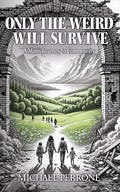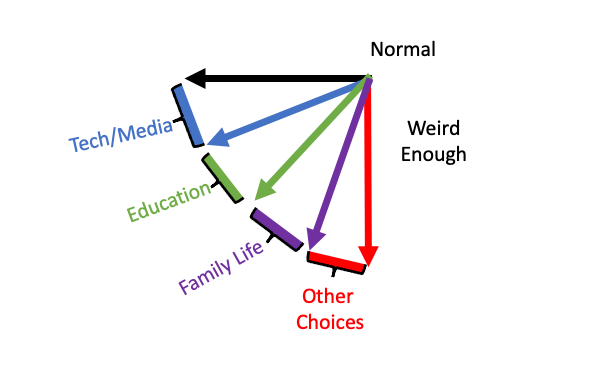Almost exactly one year ago, I wrote a post called “How Weird Are You Willing To Be?”. It’s one of my most viewed and shared posts ever and the single highest source of new subscribers to the “Build The Village” Substack. It generated a ton of conversations in real life with friends and family too.
The basic idea of the post is this: if the normal way of doing things is unhelpful, wrong, or dangerous, as it increasingly feels it is… if it leads straight off a cliff, then how weird are you willing to be to save yourself and your kids from the cliffside? How weird are you willing to be in your career, education, family life? How weird are you willing to be in your parenting methods, in how you raise your kids or in how you spend your time? How weird are you willing to be with how you use tech and entertainment?
It’s my conviction that to succeed and survive in today’s world, we’re going to have to be “weirder” than any of us set out to be.
This basic idea and the conversations it generated fascinated me and so I kept writing on it, and writing on it some more. Pretty soon it turned into a book. A book I published in December called “Only The Weird Will Survive”.
What’s the basic premise of this book?
In short, the premise of the book is that normal life, while freeing and convenient, is isolating, alienating and results in the near total loss of community which we all deeply feel. And that to reverse that loss, we must create a community that makes sense in the context of the 21st century.
It’s easy to get lost in nostalgia about some idyllic past or in memories of our youth, neither of which is ever coming back. However, new communal associations and structures can be built from where we are today. The purpose of the book is to show us how.
Who is this book for?
I wrote it as a man primarily to other men. I’m a guy and I know a lot of guys and whether or not they’re rich or poor, successful or unsuccessful, married or single, young or old, extraverted or introverted, etc, nearly all of them share this problem: they’re lonely and they struggle to meaningfully connect with other men. If they’re young, they struggle to envision a path to productive manhood. If they’re old, they struggle to lay out a path for their sons to that same productive manhood.
This isn’t to say women can’t benefit from the book, but it certainly speaks first and foremost to a male experience and worldview.
What’s the solution presented in the book?
This is not an “Atomic Habits” type of book with a neat and concrete set of steps that lead to a neat and concrete conclusion.
The contexts of community which were commonly understood before are dead and gone now... inaccessible to us. Community, especially one that is good for men, has to be reinvented.
The experience I had writing this book reminded me of the Book of Revelation, which is one of the most symbolic books in the Bible. This is because it’s very difficult to concretely describe something that hasn’t happened yet. And yet out of that symbolism comes beauty, mystery, insight and an endless and inspiring call to action.
Those of us looking forward to and striving to rebuild a sense of community in our lives are not entirely unlike John the Revelator on the island of Patmos: groping toward an understanding of something that won't be fully understood until after it happens.
With that caveat out of the way, what kind of solutions are presented?
I wanted to write a book that was entirely within the power and free will of a man or a group of men to bring about and to make real. And so the solutions I outlined in the last half of the book deal primarily with choice, attention and intention. These are I think the three most powerful tools in the arsenal of anyone who wants to rebuild community.
Making different kinds of choices, choices which build community, is weird, hence the title. In order to have the desire to make those choices, we have to be persuaded to do so. So this book is written to be persuasive rather than analytical or technical.
In the book, I don’t mention any legislative action, or public policy changes or anything else that you and your friends couldn’t choose to do tomorrow if you wanted to.
Is this a political or a religious book?
It’s definitely not political. Politics bore me.
It’s definitely a religious and specifically a Christian book. The book draws heavily from the Christian idea that God wants us to serve and solve our problems within a community setting. I’m a Latter-day Saint and while I draw a few aspects of the book that are particular to my religion, it’s easily accessible to any nominally practicing Christian.
How long is the book?
Including endnotes and what not, 194 pages or almost exactly 50,000 words. That’s shorter than most non-fiction books because I don’t share useless anecdotes or repeat the same idea 100 times.
Have you ever written a book before?
I’ve written several non-fiction books before as well as a collection of short stories. This is the longest and most ambitious book I’ve ever written. It’s certainly the best thing I’ve ever written.
Why should I buy the book?
If you enjoy what you read here at the Build the Village Substack, you get a deeper exploration and expansion of these ideas in the book.
I know of nothing else like it. That’s why I wrote it.
While this problem is widely recognized, I don’t know of anyone else saying “this is the formula to community. You can try it, you can do it now.”
Do you want a tighter knit community?
Do you want to understand and solve for the pervasive loneliness of modern life?
Do you want your kids to have kids?
Do you want to have a positive and enriching vision for the role men play in community?
Do you want to create powerful stories and culture that will reach into the future for generations?
Then you should consider buying and reading this book.
Where can I find the book?
The book can be bought from me directly or from the self-publishing company I used called Lulu.com. I declined to make it available anywhere else.
Find it here:




I have ordered the book as I have enjoyed your substack a lot.
This look cool, Michael. I will get it. I'm about to write a post on (masculine) rites that draws heavily from Richard Rohr's, "Adam's Return".
https://store.cac.org/products/adams-return-the-five-promises-of-male-initiation
I was planning to draw some wisdom from a couple of your previous posts as well, and so I may wait read your book first before I finish the post.
Cheers.